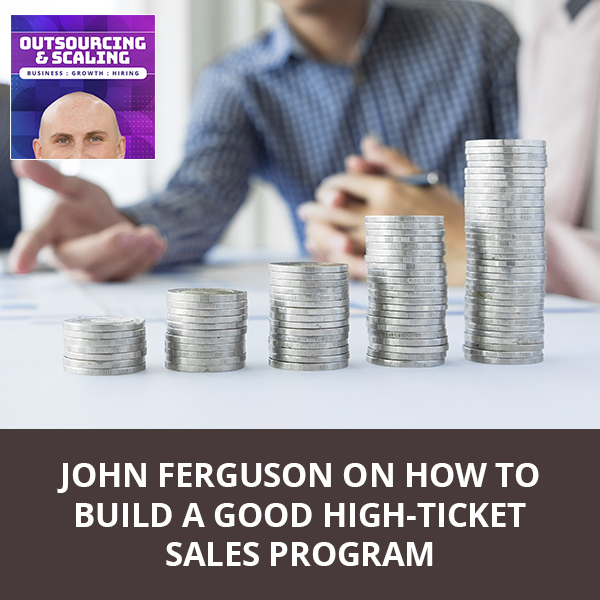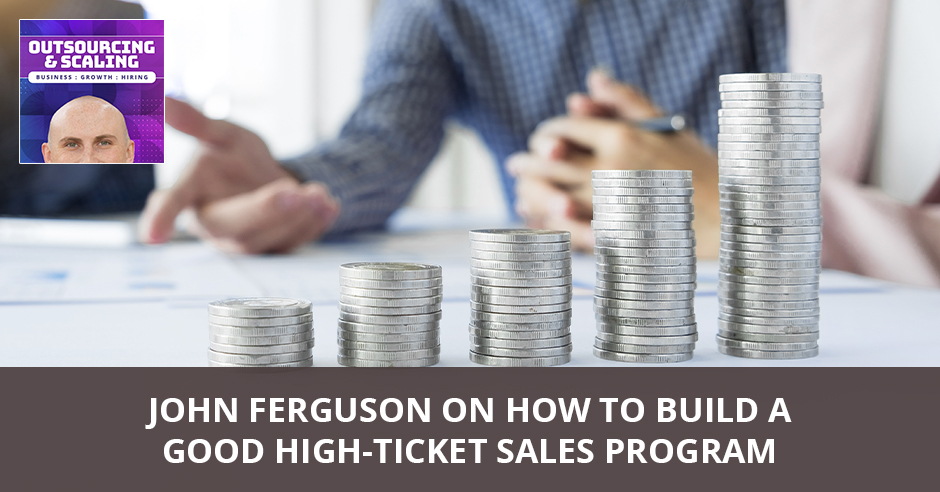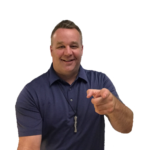


The sales process can be just as intimidating as high-ticket selling seems to be. If you are in this industry but have no idea how to go about it, then John Ferguson has the wisdom for you. A sales authority who has been in high-ticket sales design for eight years, John takes us on a ride to cracking the code on building a good high-ticket sales program that can help you and your salespeople’s abilities level up. He sheds light into some of the things people do wrong in the process and gives some great know-hows that will keep you from over-promising and under-delivering. John also talks about the hiring process and continuing motivation over time.
—
Listen to the podcast here:
[smart_track_player url=”https://www.podetize.com/statsapi/www.podetize.com/wp-content/uploads/fileuploads/11-5b145ef137b51b3d1af0633e9305c43d/09/2019/8b512c19798ff7a466daf87ace8e457c.mp3″ title=”John Ferguson on How To Build A Good High-Ticket Sales Program” artist=”Nathan Hirsch” image=”https://freeup.net/wp-content/uploads/2019/04/OAS.png” ]
Download the audio file here.
John Ferguson on How To Build A Good High-Ticket Sales Program
My guest is John Ferguson. John, how you doing?
I’m fantastic. Thanks for having me.
For those of you who don’t know, for the past several years, John has been in high-ticket sales design, working with clients like Rich Dad LLC in 2006 to Loral Langemeier’s Live Out Loud and many more. Taking previously hidden sales method out from behind the big current, bringing them into the streets so sales pros can level up their abilities. He designed, increased and implement premium priced coaching, mentoring, masterminds and courses offering into a sales flow. There are clients begging to buy from the expert. We’re going to talk all about that but first, let’s take a gigantic step back. What were you like growing up? Were you a straight-A student? Were you a rebel? Did you always know you wanted to be an entrepreneur?
I didn’t know that I wanted to be an entrepreneur until I saw and found out that my father had been laid off seven times before I was seventeen. I had no idea how the actual entrepreneurial world worked. My father worked two to sometimes three jobs every single year. We’d clean churches on Saturdays to make things work. We lived with my grandmother probably for that entire time until I was about seventeen. In school, we moved around like middle school to high school back to different schools. I never had that core group of friends that I could latch onto because I was always moving around and that caused some issues and I have dyslexia. I was diagnosed with dyslexia when I was eight, which reading and writing and all that was just rough for me. Everything was upside down and backwards. Math, I was okay with, but everything else that mattered in school. My grades were about C-average. Nothing to shake a stick at.
What was your first real entrepreneurial endeavor in the real world?
If you don’t keep sales and marketing congruent, you’re going to have challenges on the back-end.
I laugh and maybe this isn’t entrepreneurial for everybody, but my very first opportunity was real estate investing. I started off in an MLM that taught real estate investing. That was probably my first venture into it. I purchased an infomercial that was $25 and bought the package. I started out trying my wealth into real estate investing. I liked what they were saying on the infomercial. I was up late at night, 2:00 AM, bawling my eyes out because I was capped out at where I was. I was frustrated and I was facing a layoff. I didn’t know how I was going to pay for my family. I said, “I’ve got to do something different.”
Who was your first hire and how did that go?
My first hire was essentially a bird dog. In that industry, you hire individuals that can go talk to people. This is where I started to learn more about sales and selling and building relationships and how to ask specific questions. Because when you go into somebody’s house, when they’re about to lose their home, you have to have a specific skill set. In the beginning, I hired people from the newspaper and Craigslist and said, “Here’s the script. Here’s what you got to do.” I started to outsource that way. It turned into a fiasco. I was going through and turning over so many people that I started doing it myself because if it is to be, it’s going to be up to me. That was tough.
How did you get into high-ticket sales?
High-ticket sales came around when I had lost a lot of my real estate business. I had done well. I had brought on some partnerships and I have built some relationships that tore things apart. I went through a foreclosure with one of our rental properties, the first rental that we had purchased. We had a lot of deals that we were losing. It took us some time to capture and recapture our wealth. I ended up living in my parents’ basement. I started to downfall and for six months, I hid. I was in an unfinished basement in Lindon, Utah, this small little town outside of Provo, Utah, if any of your readers know where that is. I was stuck. I got a phone call one day and said, “You’ve got some good sales skills. I want you to come try working with this company.” At the time, it was a company called Wealth Intelligence Academy. It was owned and operated by Russ Whitney out of Cape Coral, Florida. He’s an old school real estate investor guru guy, one of the first.

At the time, I didn’t even know that world existed. I didn’t know high-ticket sales was a thing. I didn’t know coaching was a thing until I got into this call center and I saw the results that were happening and I had to get in. That was my first experience to see that you could sell something over the phone and make $65,000. You could close giant ticket sales. That was pretty awesome. All these guys at first were outsourced. They had some at home sales guys. They had some people in the office. Depending on where their needs were, they were either outsourcing salespeople or they had in-house. I started to see the different realm that that cost. I was addicted to that point.
How does someone go about building a good high-ticket sales program?
The first thing is you have to understand your marketing. If somebody doesn’t understand their messaging and they tried to get closers on the phone, it’s going to be a broken message. We see it all the time where the message on the back-end doesn’t meet the marketing. It’s always been that sales versus marketing sometimes. If the two don’t talk to each other, if you don’t keep it congruent, then you’re going to have challenges on the back-end. You’ll have over-promising and under-delivering. That’s what the guru will feel or the expert will feel, but it’s just a missed message. On the front-end, people will be coming in and not understanding why they’re being called for coaching or masterminds or mentoring. If that is broken, then you have a bad process. You have to fix that. The first thing is understanding where your people are at, where they’re going along that road. A lot of people use the term value ladder or they’re upselling their products or coaching masterminds, higher-ticket products. They have to understand that model before they can go in and start building out a high-end coaching platform. That’s probably the first step.
What’s the next step?
After that, you would come in and we would want to design out exactly what your scripting is. What are you selling? Is it going to be coaching and what’s the fulfillment of that thing? Because it’s all about how you get people to qualify to earn the right to buy the product versus the product selling itself. You have to reverse the sales process in order for the clients, in a sense, to earn the right to own what you’re selling. At that point, we would come in and you would want to design out your scripting. Is it a one-call, two-call, three-call? Is it over two days? Is it a product and price point that you can hop on the phone and discuss exactly what the details are and sell the person? Back to marketing, what’s the messaging? Have they been in a product that you have sold them before and how good is that lead? Have they paid you $2,000 to $10,000 in the past and now you’re upgrading them to the next level?
When selling, make sure that your message is married to the sales process.
There are a lot of different intricacies that we want to iron out before we go into, “Let’s just go hire a closer.” I know a lot of influencers want to get off the phones because typically they’re the ones who are selling their people and that causes some friction in their business. For them to be able to trust the process, they have to go hiring somebody or outsourcing to let’s say a closer or a salesperson. They have to make sure that message is married to that sales process, design your scripting around that. A good closer should be able to take on that scripting and close sales with integrity of what you’re offering.
Where do you see people go wrong when they’re creating a high-ticket program?
They try to close the sales themselves. They lose a lot of integrity with the client. I know in the beginning, someone who’s not in the $2 million to $8 million revenue range may not have the revenue to outsource to salespeople. The other thing too is trusting too early that the salesperson is prepared and has the skill set to close their sales. The third thing is not talking. It’s a breakdown in communication. If you’re hiring a salesperson, what I see a lot of is salespeople are a dime a dozen. You can pick them up on any street corner. You can and there are a lot of salespeople out there, but if you want the right type of salesperson that’s going to lend credibility to your business, you want to spend some time interviewing that person.
Once you find the right person, the right fit, make sure that they understand the messaging. One of the first things I make sure all of our closers have is access to all of the training. Not that they’re going to go through it, but they have access to all the training. They get an email, they’re on the email list, so they’re seeing and reading the emails that are going out to the prospects. They’re in every webinar, they know the webinar, they know the changes. It’s maybe not that they’re watching it all the time, but they have the transcript. They know the words that are being used, they know the language that is being said and the message that is being told. We’re able to engineer that into the scripting so that you are essentially speaking the same language to the client. That congruent message and the client feels more confident and comfortable.
You don’t have to over-promise and under-deliver or deal with a lot of objections. When you’re not using the same language, when you’re not messaging the same as what these people seem coming through, it breaks down the messaging. I know that’s a lot there, but those are some of the things that some people do wrong when they’re trying to hire out closers. If they don’t marry that message to the salesperson, it causes a lot of friction and a lot of breakdowns. The amount of sales you get go down and then the closer has to sell because they want to feed their family. Sometimes you’ll find people overselling the results. It creates this mesh of bad sales. It’s not one person’s fault. It’s the entire soup. You put too much salt in and it’s going to taste bad.

What other tips do you have for hiring salespeople? That’s not only one of the hardest things to hire and find good people, but I know a lot of people probably struggled with it. It can be frustrating to invest a lot of time in a salesperson had it not work out. What tips do you have?
The first thing that I would do is make sure that they had some experience if you’re talking about somebody who’s on the phone. You can typically hire somebody who is a year or younger in the business as long as they’re coachable and teachable. I would take them through some line of questioning on if they have interest in what you’re selling. Let’s say for instance if I’m hiring somebody for the real estate world, I’m not going to hire someone that hates real estate but loves cars. They’ve got no interest. They’ve got no desire to talk about it. That same energy won’t come across on the phone if you’re trying to hire for high-ticket real estate courses. On that end, if you’re looking to hire somebody who is good at let’s say, search engine optimization or social media, but they’re not online or they don’t care to be, but they think that they’re a good closer. They’re not going to have the same energy and desire to move forward.
Having a good interview process, probably two or three interviews. I design a questionnaire of their hobbies, likes and dislikes. I know it sounds funny to ask salespeople that in a corporate world or even hiring a one-off salesperson that you’re going to outsource your leads to, but it’s so important to find out who these people are and to find out where their hobbies lie. If they’re not connecting, ask them why. Why do you want to get into this business? You’ll find out why they’re attracted to you. If it’s just because “I want to make a 20%, 30% commission on selling because they’re good,” they’ll struggle. That’s probably the best thing to do is take them through interview process yourself. Find out who they are, what they’ve done, what their skill set is and ultimately are they coachable and how well will they learn and apply the process if they like what you’re doing. It’s key.
What about continuing that motivation over time? You find a good salesperson, your business is growing, you’re adjusting, you’re hiring more people. How do you keep people around and reduce turnover?
The cool thing with salespeople is a lot of times if you get good salespeople who are professional and they want to continue, don’t ever mess with the commission. Set the commission and the tone up front, “Here’s what the commission scale is,” and don’t mess with it. You can always go up in payment, you can’t go down. A lot of times I see where that loyalty of a salesperson breaks down is when the company adjusts because they may be changed where they’re gathering the leads. They have to spend more, but then they have to find and cut costs somewhere else. They cut costs typically in the sales commission. A lot of times, that will because of animosity on the sale. Your closer or your sales team has to work a little bit harder or they start again. They start that process of if “I’m going to make X, I’ve got to close two or three more sales a week, but how much time do I have to do it?” They start to make mistakes or over-promise or they rush the sales process and miss points that you want covered.
Don’t over-manage the salespersons to where they feel suffocated. Give them some leeway to work things out.
That would be the number one thing. I wouldn’t mess with the commission scale. That’s probably the biggest one. Number two, stay consistently communicating with your sales team. Don’t over-manage because a lot of salespeople get into the groove. They get their commitments down of what they’re going to do. Don’t over manage the salesperson to where they feel suffocated. Give them some leeway to work things out. The third thing I would do is I’d have a touchpoint every single week, whether that’s Mondays, Wednesdays or Fridays. Touch base with the sales team. See how they’re doing. Make sure that they are actively dialing. There are ways to do that without feeling like you’re this micromanager or where they feel like there’s this thing hovering over them. This person who’s going to get them if they don’t perform and then help them set their own realistic goals. For instance, how many dials that they should be getting done in a day, to how many contacts should be done, to how many appointments should be set.
Let them set the first goal and then help them go about 10%, 20% above that for the week. Start to build on that every single week. They can’t go below that. They have to continue to go above. That’s a stretch goal. Letting them set the goal, they’re going to feel more connected to it than if I was to say, “No matter what, you have to do 100 dials a day. You have to have many appointments.” For good professional salespeople, they know the amount of money that they want to make and they have that goal in line, so they’ll know what they have to do. If you can communicate back and forth, it’s a relationship. Those are some of the things that break down in most sales systems where salespeople leave. It’s either they feel over-managed, that they’re not valued because someone is forcing them to do goals or their commission has been changed. That’s probably the three things that will kick a salesperson out. Retaining that person is consistency.
What are some of the other key hires that you should be making in a high-ticket business?
Is it key hire as far as in sales or just high-ticket business itself?
We talked about sales already, so outside of sales. What else do you see that your clients are hiring for or that you are hiring for?
Several things that we’ll be hiring for is compliance. You want a compliance officer that deals with the TSR, which is the Tele Sales Rule, the FTC and SEC guidelines. You want to take somebody through a compliance third-party phone calls scripted out and recorded for your protection and your client’s protection. That can be outsourced. You typically want somebody who is not a part of the company. You can hire a virtual assistant for that. You can have someone who is outside the organization that’s not a part of that sales process. Essentially, read a script and make sure that everything is on the up and up. That’s a big thing that a lot of people don’t do because they think it’s costly. With your services, your readers that have access to FreeeUp, they can find that type of a person. I’m sure they can help with that process. When it comes down to lead management and organization, someone who can handle all the notes, all the back-ends using the different systems and CRM that’s being used. You have to run that system depending on how many leads you have coming in. The checks and balances, that’s somebody that typically is outsourced as well.
What else did I miss? What else should people know about high-ticket programs?
With high-ticket programs themselves, don’t be afraid. If you’re going through and you want to get into an influencer’s product or influencer’s program or a guru training, go through the process. Take the time and be patient with the process to get the details. Understand what it is they’re trying to help you with. Sometimes people would ask, “Why are you asking me all of these questions to understand what I’m doing? All I want to do is go to this event.” Not all events are right for all people. If someone is creating a process or you’re looking to go into a process, make sure to be patient with that process. Patience is key.
Where can people find out more about you? What are you most excited about for the rest of the year?
The cool thing is we’ve built a community on Facebook called Legendary Closers. If you go to Facebook, you can jump into our community of high-ticket sales people, influencers, coaches, experts that can jump in there and work together on sales. The goal is having everybody work together. There’s not one influencer or one expert, but all of what is being shared has to have proven results tied to it. They can find out a little bit more about me and the podcast at LegendaryClosers.com. When they join the group, we’ve got a program for your readers that’s called SIQFURY Sales Inception Questions that we’re going to be giving away to any of your readers that come into the group. We’ll make sure to email them a link that they can get access to SIQFURY. It’s a training that we put together to help people uncover internal buying triggers without a lot of friction and handling a ton of objections.
I appreciate you coming on.
I appreciate you having me on as well.
Important Links:
- John Ferguson
- Rich Dad LLC
- Live Out Loud
- Legendary Closers on Facebook
- LegendaryClosers.com
About John Ferguson
 John Ferguson18 years in high ticket sales design working with Clients like my first RichDad LLC in 2006 to Loral Langemeir’s LiveOutlOud and many more. Taking previously hidden sales methods out from behind the big current, bringing them into the streets so sales pros can level up their abilities. We design create and implement premium priced coaching, mentoring masterminds and course offerings into a sales flow that has the client begging to buy from the Expert.
John Ferguson18 years in high ticket sales design working with Clients like my first RichDad LLC in 2006 to Loral Langemeir’s LiveOutlOud and many more. Taking previously hidden sales methods out from behind the big current, bringing them into the streets so sales pros can level up their abilities. We design create and implement premium priced coaching, mentoring masterminds and course offerings into a sales flow that has the client begging to buy from the Expert.
Promo: Join other Subject matter experts, influences and closers in our community on facebook /legendaryclosers there is also a free training called SIQ-Fury we will give to anyone joining and void the $1997.00 fee.
